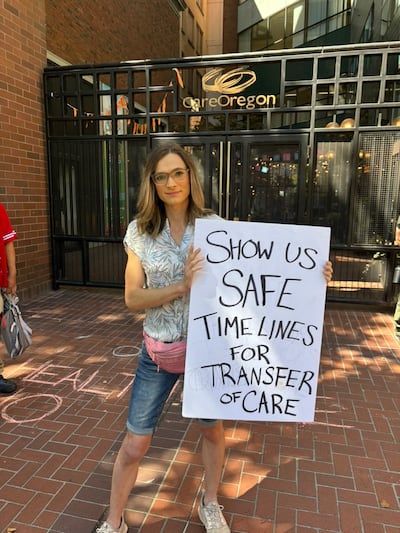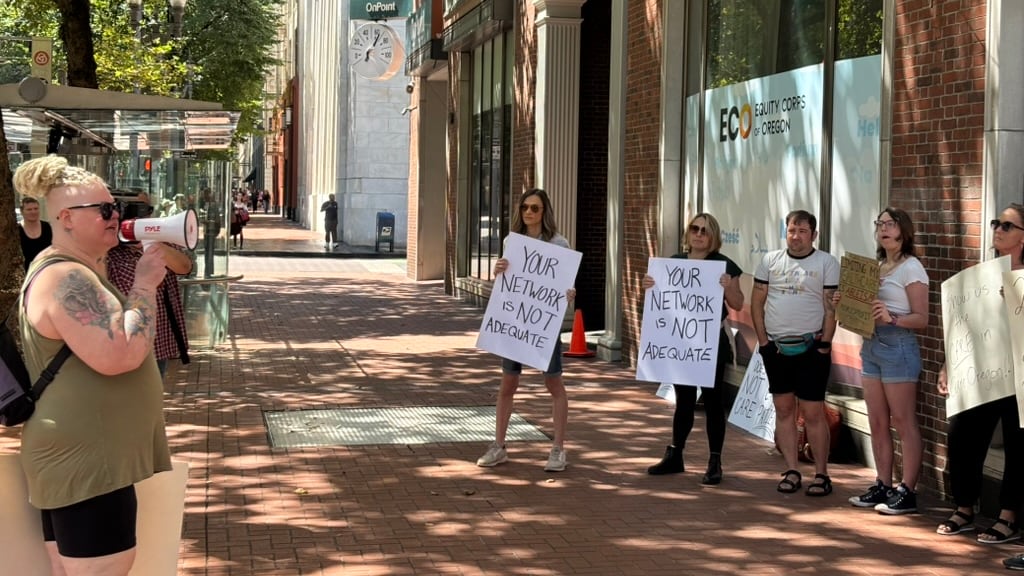A few months ago, Braedan Hansen says, he was working as a caretaker for an ailing family member when he had a breakdown. He’s had a hard time finding a therapist in the past—he recalled giving up the search after monthslong wait times during the pandemic—but this time he found a good one that his Portland-area Medicaid plan would pay for.
“Before, when I was just left to my own thoughts, I was in a hole that there’s no way to dig out of,” Hansen said in a phone interview. Therapy attuned him to the potential for change and small improvement, he says. But at an appointment a few days ago, he got news he found unsettling: The twice-a-week sessions with this particular therapist may soon have to end.
Versions of that conversation have been taking place in therapy and counseling sessions all across the Portland area in recent days, owing to a policy change announced by the state’s largest Medicaid insurer. The news has set off what one counselor calls a “mad scramble” for therapists and social workers to offload their clients in what many argue is a ridiculously compressed period of time.
The period is two months. CareOregon, the largest Portland-area insurer funded by the Oregon Health Plan, said in the July 31 announcement that beginning Oct. 1, it would no longer pay for routine outpatient therapy for mental health and substance use disorder by providers that aren’t in its network.
The nonprofit insurer said the move, word of which trickled into therapist social media groups and message boards over the coming days, would end a vestige of policy from the pandemic era that had been intended to meet surging demand for therapy. Under that policy, many “noncontract” providers could bill CareOregon with relative ease despite being out of its network.
CareOregon also said the shift would align it with other coordinated care organizations in Oregon, in turn streamlining administrative management, improving quality of care, and saving scarce resources as health care costs rise and Medicaid systems nationwide brace for historic budget cuts.
“We must do more with less,” the insurer said in announcing the policy, citing an “incredibly challenging financial environment.”
Some in the behavioral health care community approve. The change will have a substantial impact on members and providers, particularly those operating out of network, said Julie Ibrahim, board chair of the Tri-County Behavioral Health Providers Association, in a written statement provided by CareOregon. “At the same time, we strongly support the goal of this transition: to enhance accountability and care quality, improve access tracking, and foster stronger partnerships across the system.”
Still, other therapists and counselors, many of whom run smaller private practices, are livid and want to see hard evidence that CareOregon’s cost-saving and quality rationales stand up to scrutiny.
The furor hints at how Oregon’s health outcomes—including mental health, with which Oregon struggles—hinge on the distribution of Medicaid dollars, and how even a small shift in that allocation can disrupt thousands of lives.
Change has been afoot at CareOregon. In July, it laid off 80 employees, The Oregonian reported. In December, the insurer said it would restrict reimbursements for out-of-network prelicensed therapists.
But those providers were given more than six months to cycle patients out or adapt to the new guidelines. The new announcement is far more consequential, several therapists say, yet the two-month timeline is far more aggressive.
“I’m under no illusion here,” says Sabrina Arnold, a Portland licensed counselor. “I get that I’m noncontracted. I understand that I don’t have the same guarantees or promises that somebody who is contracted has, and I understand that CareOregon is allowed to make these decisions.”
“And also,” she adds, “it’s too quick. It’s not giving people enough time.”
CareOregon issued written statements, but did not respond to several specific questions from WW, including one seeking an explanation for the timeline.
The two-month timeline is “unconscionable and truly not possible,” said Chelsea Mier Harrington, a Portland licensed counselor, in a phone interview.
Like many therapists, Harrington says building trust with patients, particularly vulnerable ones typical to the Medicaid system, takes care and time. Ending these relationships abruptly can cause great trauma, she says, and many doubt CareOregon has the capacity to care effectively for the displaced clients.

CareOregon says it does, in fact, have the capacity. All told, some 15,000 members will be affected by the change, a spokesperson for the insurer said, a figure constituting about 15% of all CareOregon members who receive a behavioral health service. “We know change can be hard and we are committed to helping transition care for all members who will be impacted,” the spokesperson said in a statement. “Our network of contracted behavioral health providers can meet the needs of those seeking behavioral health care and services.”
Others are dubious. “I was turning away between two and four people with CareOregon every week,” says Elizabeth Langford, another licensed counselor.
Activated in group chats and message boards, numerous behavioral health practitioners contacted Willamette Week in recent days. Many fit a similar profile. Mission driven, they’d worked in larger community health organizations—which often serve Medicaid patients with particularly acute mental health or substance use disorders—but found the caseloads untenable, the work taxing and dangerous, and the pay inadequate. So they decided in recent years to launch their own private practices, where they could manage their own caseloads, often charging more well-off clients privately while also being able to retain their sense of mission by seeing Medicaid clients as well.
This is because, even though they could not get contracts to join CareOregon’s network (many said they tried but CareOregon appeared to be letting few, if any, in), the insurer was still willing to pay them to see its members. Actually, it paid quite well.
“They do pay the best out of anyone that I’ve been able to find,” says Arnold, who adds that 11 clients of her Out of the Woods private practice get insurance through CareOregon. Citing rules that discourage open talk of prices, she declined to disclose the rate, but another therapist reported getting paid $185 for a one-hour session, a figure consistent with CareOregon’s online pay schedule for out-of-network mental health providers.
Compared with other U.S. insurers, Medicaid is not generally famous for paying well. But a recent report by the state suggested what may be driving reimbursement rates up. In 2023, Oregon directed its Medicaid insurers to pay behavioral health providers, such as therapists, better to get more of them into the system.
What happened next, the report said, is that more behavioral health practitioners made their services available to members of Medicaid plans, like CareOregon’s. And then way more of these Medicaid members started going to therapy. For Oregon Medicaid insurers, therapy claims—and costs—increased significantly.
Many therapists said CareOregon members made up the bulk of their clientele, making the potential loss a business threat. But licensed therapist Tahlia Harrison, among others, says the anger goes deeper. “Our outrage is about patients,” she says.
Arnold says she is working to find in-network therapists for her clients as fast as she can, but it may end up that, come October, she’ll feel the need to keep seeing some clients pro bono. “I’m not going to be part of a situation where one of my clients is going to be in crisis and not have somebody.”
Confusion abounds. As do rumors of loopholes, though many say CareOregon has offered little clarification. “The communication has been poor,” says Charlie Blackmar, a licensed clinical social worker who focuses on patients with suicidal ideation.
It may well be that some small subset of patients, after an unpleasant turn through the health bureaucracy, get to keep their therapists after all.
Hansen, for his part, says he understands he may be allowed to keep his current therapist if he switches to another Medicaid insurer around Portland—Trillium, which has a separate network. But this, as he understands it, would mean he has to give up his longtime primary care team, an option he is leaning against.
“I feel like all I’ve heard for the last probably decade of my life is how important mental health care is, and how important it is to reach out,” he says. “And now that I finally have and was able to get help, it’s being ripped right out from under me.”
Correction: This story gave an incorrect name for the therapy practice run by Sabrina Arnold. WW regrets the error.
This reporting is supported by the Heatherington Foundation for Innovation and Education in Health Care.

